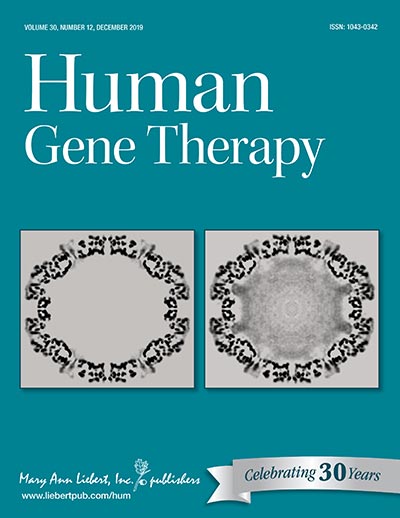For Immediate Release
Mayo Clinic Researchers Pursue Single-Dose Gene Therapy to Treat Cocaine Addiction
Contact: Kathryn Ryan
914-740-2250
kryan@liebertpub.com

New Rochelle, NY, January 7, 2020—In a radical new approach to treat cocaine addition, researchers at the Mayo Clinic are seeking approval for first-in-human studies of a single-dose gene therapy. To support the safety and efficacy of this approach they have demonstrated the successful delivery of a gene coding for an enzyme that metabolizes cocaine into harmless byproducts in mice. The study is published in Human Gene Therapy, a peer-reviewed journal from Mary Ann Liebert, Inc., publishers. Click here to read the full-text article free on the Human Gene Therapy website through February 7, 2020.
Stephen Brimijoin and colleagues from Mayo Clinic, Rochester, MN, coauthored the article entitled “Systemic Safety of a Recombinant AAV8 Vector for Human Cocaine Hydrolase Gene Therapy: A Good Laboratory Practice Preclinical Study in Mice.” In advance of filing for an Investigational New Drug Application with the U.S. Food and Drug Administration, which would allow for human testing, the researchers needed to show the systemic safety of their recombinant adeno-associated viral (AAV) 8 vector, which targets its therapeutic gene payload to the liver. They showed a total lack of viral vector-related adverse effects in both cocaine-experienced and cocaine-naïve mice at different doses. In fact, mice who received the gene therapy followed by daily cocaine injections had much less tissue pathology than those mice who received daily cocaine injections but did not have the gene therapy.
“Substance use disorders present an immense public health problem in the US and other industrialized countries,” says Editor-in-Chief Terence R. Flotte, MD, Celia and Isaac Haidak Professor of Medical Education and Dean, Provost, and Executive Deputy Chancellor, University of Massachusetts Medical School, Worcester, MA. “Putting the power of an innovative gene therapy to work on this problem presents an exciting new approach.”
About the Journal
Human Gene Therapy, the Official Journal of the European Society of Gene and Cell Therapy and eight other international gene therapy societies, was the first peer-reviewed journal in the field and provides all-inclusive access to the critical pillars of human gene therapy: research, methods, and clinical applications. The Journal is led by Editor-in-Chief Terence R. Flotte, MD, Celia and Isaac Haidak Professor of Medical Education and Dean, Provost, and Executive Deputy Chancellor, University of Massachusetts Medical School, and an esteemed international editorial board. Human Gene Therapy is available in print and online. Complete tables of contents and a sample issue are available on the Human Gene Therapy website.
About the Publisher
Mary Ann Liebert, Inc., publishers is a privately held, fully integrated media company known for establishing authoritative peer-reviewed journals in many promising areas of science and biomedical research, including Nucleic Acid Therapeutics, Tissue Engineering, Stem Cells and Development, and Cellular Reprogramming. Its biotechnology trade magazine, GEN (Genetic Engineering & Biotechnology News), was the first in its field and is today the industry’s most widely read publication worldwide. A complete list of the firm’s 80 journals, books, and newsmagazines is available on the Mary Ann Liebert, Inc., publishers website.